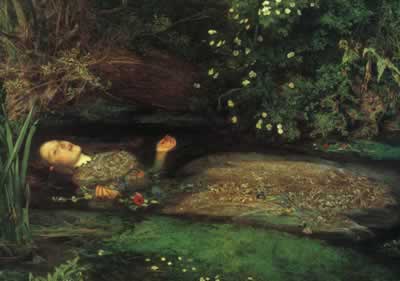Shakespeare's "Hamlet" has one female character that really caught my attention, basically because of the way she decided to commit suicide: drowning herself. Some authors point out that her death might have been an accident, while others clearly believe it was suicide. I'll choose the latter.
 |
| Sir John Everett Millais' "Ophelia" (1851) |
Many famous female characters have decided to kill themselves, such as Juliet from "Romeo and Juliet", Sybil Vane from "The Picture of Dorian Gray", Ophelia from "Hamlet" and even Virginia Woolf herself. Most of these deaths are usually related to madness, but there is a huge variety of symbols behind their deaths. Although not all of them commited suicide in the same way, two of them (Virginia Woolf and Ophelia) did.
Here I'll pay especial attention to the symbolism behind Ophelia's suicide.
According to Gaston Bachelard (1983), there is a symbolic connection between women, water and death: drowning was usually associated with female fluidity, in contrast to masculine aridity, where drowning becomes a truly feminine death. Water represents the profound symbol of the liquid that a woman's body possess: milk, amnotic fluid, blood and crying eyes (this last part is a bit confusing and eye-opening at the same time since Laertes says that "when these -tears- are gone, the woman will be out" meaning that once he stops crying over Ophelia, his acting like a woman will be done, in connection with male aridity too). Some authors also state that female insanity was sort of a stimulant to male sensitivity, which is sort of messed up if we see it with 21st Century Western eyes. Maybe female insanity was the only way in which a man would really pay attention to a woman, after leaving her full uncertainty and crazy.
Ophelia wasn't able to handle it all, so the dilemma of being obedient to her father and playing the role she was forced to play versus being true to herself and be who se wanted to be made her unstable. Her desperation literally drove her crazy, and she had no way to heal herself, so she decided to commit suicide. Even when Ophelia died she was seen as she was always seen: pure, natural and quiet.
Many authors connect Ophelia's madness with patriarcal pressure and abuse from both Hamlet and her father who basically pushed her to hate her role in society, then try to be herself and finally kill herself, and I couldn't agree more. I believe that Ophelia couldn't handle so much pressure and besides being mad, she just let it happen, she didn't even try to save herself when she was drowning and saw it as the perfect opportunity to escape from Hamlet, her father, society and their expectations.
I hope my post made sense!
References:
- Bachelard, G. (1983). Water and dreams: An essay on the imagination of matter. Dallas: Pegasus Foundation.
- Knights, L., & Knights, L. (1966). Some Shakespearean themes, and An approach to 'Hamlet' Stanford, Calif.: Stanford University Press.
- Parker, P. (1985). Shakespeare and the question of theory. New York: Methuen.
- Showalter, E. (1985). Representing Ophelia: Women, Madness, and the Responsibilities of Feminist Criticism. Pages 77-94. London: Methuen.
I cannot see the point on women attracting men by getting crazy since I don´t thing we've ever had that necessity xD. However, I'm in complete agreement with you when you say that Ophelia could´t handle the pressure from her father and Hamlet and all the situations that happened to her throughout the play. She just could not bear the pain of seeing her loved one becoming mad and her father's death. She lost control of her life and simply wanted to put it an end.
ResponderEliminarEste comentario ha sido eliminado por el autor.
ResponderEliminarHahaha maybe it's not attracting men by being insane but making them pay attention to you. I see it like this: nobody notices you (maybe) until you break a leg and everybody then sees that an pities you, you know? It's like "okay, I'm crazy, somebody will notice it". As I pointed out in my post, some authors say that insanity was a stimulant to male sensitivity, which actually makes sense to me in such a context. Of course women don't have the need to act crazy to attract men nowadays (hopefully), but it sure was a stimulant to male sensitivity in Shakespeare's works.
ResponderEliminar